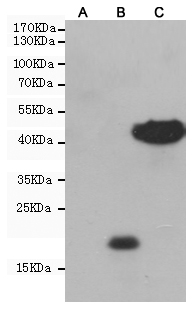-
Product Name
Anti-Myc-Tag (9E10) Mouse mAb (HRP Conjugate)
- Documents
-
Description
Myc-Tag (9E10) Mouse mAb (HRP Conjugate)
-
Tested applications
WB, ELISA, IHC-P, IP
-
Species reactivity
Tag
-
Isotype
Mouse IgG1
-
Preparation
Antigen: Synthetic peptide corresponding to Human c-Myc aa 400 to the C-terminus (C terminal) conjugated to Keyhole Limpet Haemocyanin (KLH).
-
Clonality
Monoclonal
-
Formulation
In PBS(pH 7.4) containing with 1mg/ml BSA 0.03% Proclin300 and 50% glycerol.
-
Storage instructions
Ship at 4°C. Store at 4°C short term. Store at -20°C long term. Avoid freeze / thaw cycle.
-
Applications
ELISA: 1/100 - 1/500
dilution.WB:1/10000 - 1/50000
-
Validations

Western blot analysis of extracts from CHO-K1 cells, untransfected (A) or transfected with different FLAG-fusion proteins (B, C), using Myc-Tag (9E10) Mouse mAb (HRP Conjugate) Mouse mAb (1:1000 diluted).
-
Background
Epitope tags are short peptide sequences that are easily recognized by tag-specific antibodies. Due to their small size, epitope tags do not affect the tagged protein’s biochemical properties. Most often sequences encoding the epitope tag are included with target DNA at the time of cloning to produce fusion proteins containing the epitope tag sequence. This allows anti-epitope tag antibodies to serve as universal detection reagents for any tag containing protein produced by recombinant means. This means that anti-epitope tag antibodies are a useful alternative to generating specific antibodies to identify, immunoprecipitate or immunoaffinity purify a recombinant protein. The anti-epitope tag antibody is usually functional in a variety of antibody-dependent experimental procedures. Expression vectors producing epitope tag fusion proteins are available for a variety of host expression systems including bacteria, yeast, insect and mammalian cells.
Related Products / Services
Please note: All products are "FOR RESEARCH USE ONLY AND ARE NOT INTENDED FOR DIAGNOSTIC OR THERAPEUTIC USE"
